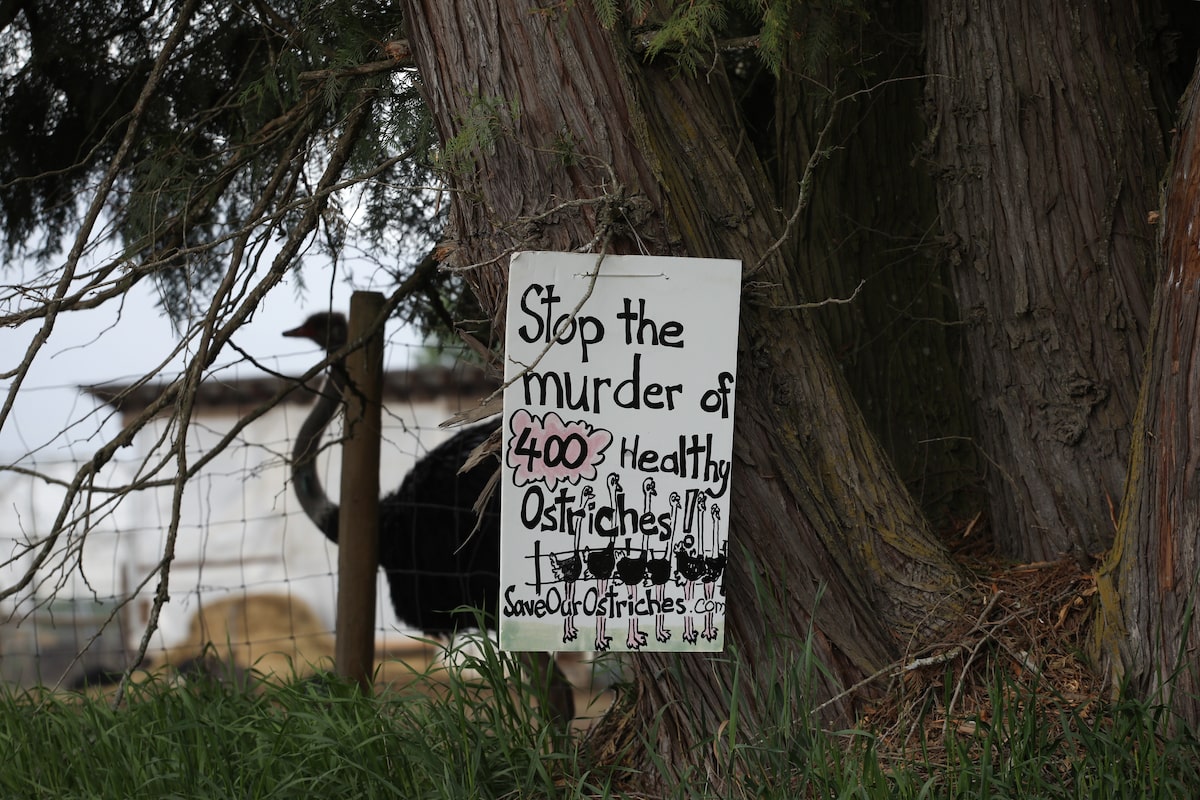The Federal Court of Appeal in August upheld a lower court ruling that the CFIA had the authority to destroy a flock of 400 ostriches at Universal Ostrich Farms in Edgewood, B.C.AARON HEMENS/The Canadian Press
The owners of nearly 400 ostriches on a British Columbia farm are hoping the federal Minister of Agriculture will step in and save the birds from an execution order after reviewing fresh evidence of the ostriches’ good health.
Umar Sheikh, a lawyer for Universal Ostrich Farms, said he planned to send a package of evidence Sunday night to the Canadian Food Inspection Agency and Agriculture Minister Heath MacDonald in a bid for ministerial reconsideration, one of the last remaining avenues to preserve a doomed flock whose fate has become an international cause célèbre.
“I’m very hopeful that they will look at it and perhaps come to a conclusion that there’s a workable solution,” Mr. Sheikh said.
But he also cautioned that “the window is very narrow for us” because the Federal Court of Appeal in August upheld a lower court ruling that the CFIA had the authority to destroy the flock after a highly pathogenic version of avian influenza was confirmed in some of the ostriches last December.
The same court granted a short-term stay of the CFIA’s cull order on Saturday.
The death-row plight of the ostriches in remote Edgewood, B.C., has garnered attention around the world, including from top officials in the Trump administration.
Cull order on B.C. ostriches a ‘one-size-fits-all’ approach, federal appeal court hears
Robert F. Kennedy Jr., the U.S. Health and Human Services Secretary, has written letters to the CFIA and Mr. MacDonald asking that the ostriches be spared. Mehmet Oz, a former TV doctor who now oversees Medicare and Medicaid, offered the ostriches sanctuary on his Florida ranch, an overture the farm politely declined.
American billionaire businessman John Catsimatidis, who put the case on the radar of Dr. Oz and Mr. Kennedy, is helping to bankroll the farm’s legal fight. He also pleaded the ostriches’ case in a letter to Prime Minister Mark Carney.
Katie Pasitney, a spokeswoman for the farm and the daughter of one of its co-owners, said in an interview Sunday that she was relieved to hear about the interim stay. But she feared the reprieve wouldn’t last.
“We’re here to just again ask them to stop. Please stop,” she said through tears. “You picture almost 400 animals running for their lives. This is just wrong.”
The CFIA ordered the stamping out of all the ostriches at the Edgewood farm on Dec. 31, 2024, after two dead ostriches tested positive for a highly pathogenic version of H5N1.
Sixty-nine of 468 ostriches died in the outbreak; the surviving birds have been healthy and symptom-free since mid-January, according to Ms. Pasitney.
Highly pathogenic avian influenza has decimated wild and domesticated birds across the country since it was first identified in Canada in 2021. The virus has killed or prompted the culling of more than 14 million farmed birds, the CFIA says.
B.C. owners of ostriches hope high-powered names and bird-flu survivor will save flock from cull
Lawyers representing the CFIA’s position at an appeal hearing in July said the agency’s stamping-out policy is designed to mitigate the spread of a dangerous virus.
The CFIA also argued that failing to follow the policy could have negative trade implications if it prompts other countries to block exports of Canadian poultry.
Shayan Sharif, a professor of immunology who specializes in avian flu at the Ontario Veterinary College at the University of Guelph, said the CFIA’s policy reduces threats to human health, even if they’re remote.
Part of the concern with the ostriches is that a novel re-assortment of the H5N1 virus was identified on the farm.
If any of the surviving ostriches are harbouring the virus — which is possible even if they’re outwardly healthy — there is a theoretical risk they could spread it to wild birds, opening up another pathway for avian influenza to mutate and become transmissible between humans.
“As harsh as it may sound and as emotional as it may sound for all of us as animal lovers, I do really think that this is the right thing to do, unfortunately,” Dr. Sharif said of the cull order.
Ms. Pasitney, her mother, Karen Espersen and farm co-owner Dave Bilinski, disagree.
They have been asking the CFIA for months to test the surviving ostriches for H5N1.
As well, their lawyers have asked to present in court evidence of the surviving ostriches’ good health after the CFIA issued its “notice to dispose” order last December. The courts declined that request.
However, the Federal Court of Appeal wrote in its Aug. 21 decision that, “should the appellant wish to have the Notice to Dispose re-examined in light of the fresh evidence, its recourse is to ask the CFIA or the Minister to do so.”
That’s the remedy the farm is pursuing now, Mr. Sheikh explained. Separately, the owners can seek leave to appeal to the Supreme Court of Canada.
The Federal Court of Appeal agreed Saturday to grant an interim stay while the question of a longer stay is adjudicated, which Mr. Sheikh expects to happen quickly.
A spokesman for the CFIA said by e-mail on Sunday that the agency is aware of the interim stay. “The matter will be dealt with on an urgent basis and all supporting materials will be before the Court by September 10 so that the court can have a full record to consider.”
Mr. MacDonald’s office did not respond to a request seeking comment Sunday.

